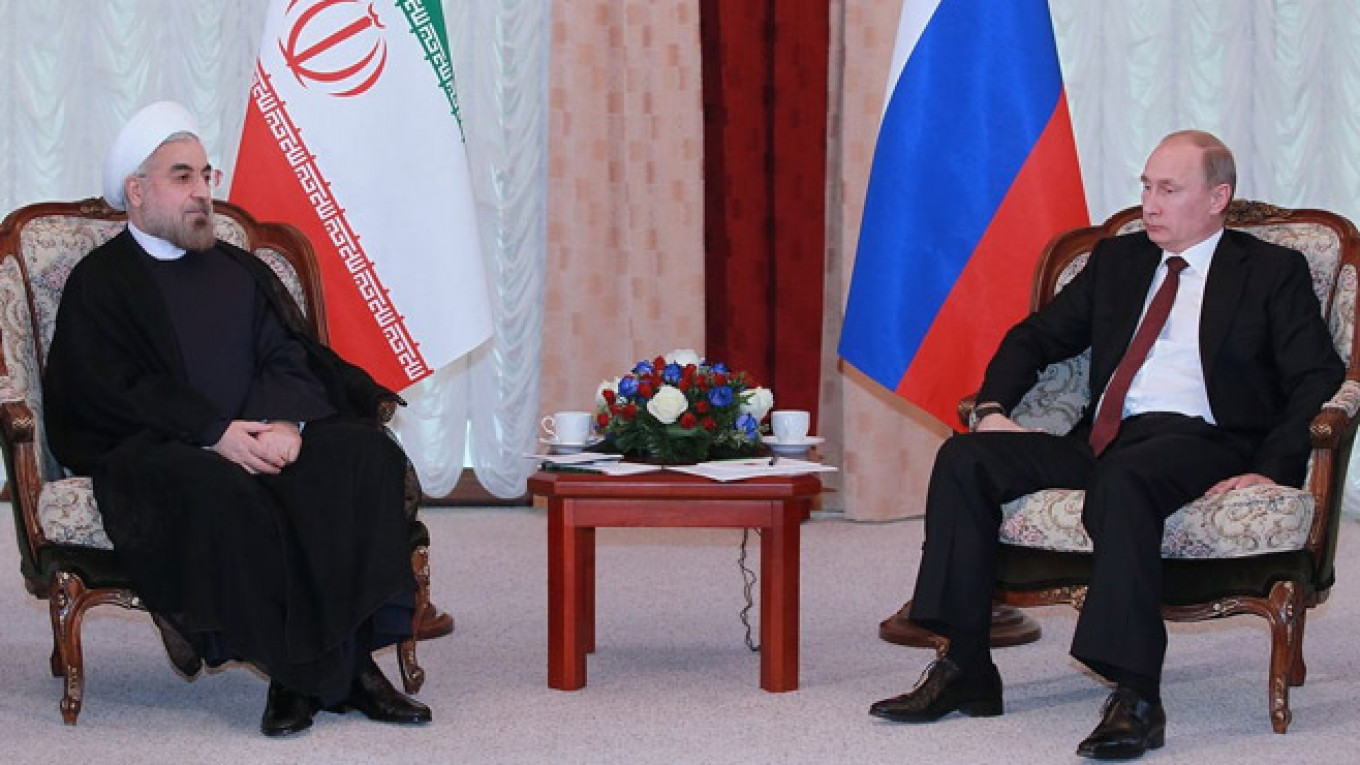As Moscow considers new ways of responding to Western sanctions, both existing and potential, the Kremlin has a range of economic and political options at its fingertips.
In addition to its current ban on importing U.S. and EU foodstuffs, a ban on the import of foreign cars may also be in the works. President Vladimir Putin could also retaliate by prolonging Ukraine's gas cutoff and ratcheting up tensions in other states with substantial ethnic Russian populations such as Estonia and Latvia.
But perhaps the most damaging step Putin could take against Western interests would be to undermine the P5+1 [the five permanent members of the United Nations Security Council plus Germany] negotiations aimed at limiting Iran's nuclear program.
Six months of dialogue between Iran and the West recently failed to yield any agreement, and despite the fact that negotiations with Iran were extended until November, the two sides remain distant.
The West's major leverage against Tehran stems from its sanctions, which have cut Iran off from the global financial system and inflicted severe hardship on the Iranian economy and its people. Sanctions were instrumental in bringing the ayatollahs to the negotiating table, and these sanctions have remained largely in place during the ongoing P5+1 Iranian nuclear negotiations.
But Russia has never been fully on board with the move to isolate Iran, and Moscow has already warned the West that it could play the "Iran card."
Speaking in March about Western sanctions after a P5+1 meeting in Geneva, Deputy Foreign Minister Sergei Ryabkov said: "We wouldn't like to use these talks as an element of the game of raising the stakes … but if they force us into that, we will take retaliatory measures here as well."
Ryabkov's subsequent statement that the "reunification of Crimea with Russia is incomparable to what we are dealing with in the Iranian issue" only emphasizes how differently the West and Russia evaluate the danger of a nuclear-armed Iran.
The Iranians are well aware that the Ukraine crisis could strengthen Iran's negotiating position. Hossein Mousavian, a former spokesman for Iran's nuclear negotiators, recently wrote: "Logic follows that Russia will play Iran's nuclear card [against the West]. Great economic rewards may also result from Russia cultivating closer relations with Iran."
Moscow has now taken concrete steps to play Mousavian's "nuclear card," signing a memorandum of understanding with Tehran to implement a $20 billion "oil for goods" accord.
While the details of the memorandum are still vague, previous reports noted that Iran would supply Russia up to 500,000 barrels a day of Iranian oil, and in exchange Iran would import Russian power and pump equipment, steel products such as pipes, machinery for its leather and textile industries, wood, wheat, pulses, oilseeds and meat.
Cliff Kupchan, a Russia specialist at the Eurasia Group, noted in Time magazine that the oil-for-goods accord "gives Iran momentum and confidence to adopt a harder position at the talks. Hard-liners now have a more plausible argument that Iran can survive economically if talks fail."
The U.S. has already responded to Moscow's oil-for goods deal with alarm. David Cohen, the Treasury Department's undersecretary for terrorism and financial intelligence, has threatened additional sanctions against Russia should Moscow move forward in implementing the deal, saying: "It is almost certain that any entity involved in the deal would open themselves up to certainly U.S. sanctions and possibly others."
The oil-for-goods deal is not the only way Russia could undermine Western interests in Iran. Russia and Iran have had ongoing discussions about the construction of additional nuclear reactors for Iran by Rosatom, the Russian state energy company. This pact strengthens Iran's case against the West that it should be permitted to enrich more uranium on its own soil, as the construction of additional reactors would increase the amount of fuel Iran needs.
And while the oil-for-goods deal and the construction of additional reactors certainly has the potential to strengthen Iranian hard-liners opposed to a deal with the West, Russia holds one card in reserve that trumps even these.
In 2007, Russia signed a contract with Iran to supply it with its sophisticated S-300 anti-aircraft missiles. Described by the International Assessment and Strategy Center as "one of the most lethal, if not the most lethal, all altitude area defense SAM systems in service," it can be deployed within minutes, track 100 aircraft approaching from 300 kilometers away, fire two missiles every three seconds and engage up to 36 planes simultaneously.
Although Russia suspended the delivery of the S-300 systems to Iran in 2010 in response to U.S. pressure, Putin could retaliate against the West by allowing the sale to go through — a decision that could change the balance of power in the Middle East.
In a speech before the UN General Assembly last year, Israeli Prime Minister Benjamin Netanyahu said Israel could never accept a nuclear-armed Iran, and the Jewish state has made clear that it will act on its own against Iran's nuclear program if necessary. Israel's vaunted air force — the IAF — would be the lead actor in an Israeli strike on Iran's nuclear facilities.
But according to Kupchan, the S-300 "is the one card that they [the Russians] have. … The S-300 can be a game changer; it would reduce Israel's ability to attack Iran."
If Russia were on the cusp of delivering S-300s to Iran, it is very possible that Israel would choose to strike Iran before the missile system were installed. Tehran could retaliate by taking any number of steps, from mining the Straits of Hormuz to launching missiles at the oil fields of U.S. allies such as Saudi Arabia and Kuwait. The Middle East — if not the world — would be thrown into economic turmoil.
The S-300s thus represent Putin's ultimate ace in the hole, should he wish to retaliate asymmetrically against Western sanctions. Would Putin actually risk such an outcome?
The Russian president has proven to be nothing if not unpredictable, and if the pressure from the West against Russia continues to mount, the West may find that Putin has his own trump card to play.
Josh Cohen is a former USAID project officer involved in managing economic reform projects in the former Soviet Union. He contributes to a number of foreign policy-focused media outlets and tweets at @jkc_in_dc
A Message from The Moscow Times:
Dear readers,
We are facing unprecedented challenges. Russia's Prosecutor General's Office has designated The Moscow Times as an "undesirable" organization, criminalizing our work and putting our staff at risk of prosecution. This follows our earlier unjust labeling as a "foreign agent."
These actions are direct attempts to silence independent journalism in Russia. The authorities claim our work "discredits the decisions of the Russian leadership." We see things differently: we strive to provide accurate, unbiased reporting on Russia.
We, the journalists of The Moscow Times, refuse to be silenced. But to continue our work, we need your help.
Your support, no matter how small, makes a world of difference. If you can, please support us monthly starting from just $2. It's quick to set up, and every contribution makes a significant impact.
By supporting The Moscow Times, you're defending open, independent journalism in the face of repression. Thank you for standing with us.
Remind me later.







